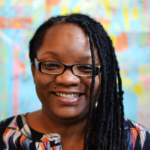Our Data Bodies Project
Who We Are
We are a five-person team concerned about the ways our communities’ digital information is collected, stored, and shared by government and corporations.
Our Team
 |
Tamika Lewis: An organizer and artist whose primary focus is advancing Queer People of Color and marginalized communities. |
 |
Tawana Petty: A mother, anti-racist social justice organizer, author, and poet, born and raised in Detroit, Michigan. |
 |
Mariella Saba: practices popular education, cultural work, and healing arts, to collectively, creatively, and healthily uproot the genocidal set-ups of our global dis-ease. |
 |
Virginia Eubanks: A writer, teacher and welfare rights organizer from Troy, NY. |
 |
Seeta Peña Gangadharan: A mother, activist researcher, and social justice optimist born in New Jersey and working in London. |
Our Organizations
Center for Community Transitions, Inc. (Charlotte): CCT is primarily focused on helping individuals with criminal records and their families navigate paths towards healthy and productive lives.
Detroit Community Technology Project: A sponsored project of Allied Media Projects, DCTP uses and develops technology rooted in community needs to strengthen human connections to each other and the planet.
Stop LAPD Spying Coalition: A sponsored project of the Los Angeles Community Action Network, SLSC is dedicated to dismantling government-sanctioned spying and intelligence gathering, in all its forms.
New America (fiscal sponsor): NA is a think tank committed to renewing American politics, prosperity, and purpose in the Digital Age.
London School of Economics and Political Science: LSE is a social science university based in the United Kingdom.
Our Principles and Values
We are guided by the principles of digital justice. These principles stress the importance of spaces through which people can investigate community problems, generate solutions, create media, and organize together. See the Detroit Digital Justice Principles at http://detroitdjc.org.
Who Funds This Work
The Digital Trust Foundation was set up by Facebook after losing a class action lawsuit. DTF funds projects that promote online privacy, safety, and security.
What We Are Doing
Based in marginalized neighborhoods in Charlotte, North Carolina, Detroit, Michigan, and Los Angeles, California, we are:
- Looking at digital data collection and our human rights;
- Helping local communities, community organizations, and social support networks;
- Growing a national conversation on safety, privacy, and data protection needs of marginalized communities; and,
- Showing how different data systems impact re-entry, fair housing, public assistance, and community development.
Why We’re Doing This Work
We are sharing knowledge and tools for data justice and for data access for equity. Our project aims to help movements for justice and support trusted modes of community health and safety.
Why We’re Concerned About Data
Data-based technologies are changing our lives, and the systems our communities currently rely on are being revamped. These data systems do and will continue to have a profound impact on our ability to thrive.
To confront this change, we must first understand how we are both hurt and helped by data-based technologies. This work is important because our data is our stories. When our data is manipulated, distorted, stolen, or misused, our communities are stifled, and our ability to prosper decreases.
What Will This Research Lead To?
From this research, we will co-create a Popular Guide to Data and Discrimination and a workbook of community activities focused on data, surveillance, and community safety.
About Our National Efforts
By starting in Charlotte, Detroit, and Los Angeles, we hope to tell the story of surveillance and data-based discrimination across the United States. We also hope to build with organizations involved in fights for racial justice, LGBTQI liberation, feminism, immigrant rights, economic justice, and other struggles to help us understand and address the impact of data-based technologies on social justice work.
How You Can Get Involved
We welcome your input! You can join us in the following ways:
- One-on-one interview: Tell your story.
- Participatory workshop activities: Help us understand your “data neighborhood.”
- Focus groups: Help us analyze all the stories we collect.
- Tools for the community: Co-create popular education activities.
- And more! Have other ideas? Please let us know!
How We Protect Your Personal and Community Information
We will always ask you if it’s ok to document the stories you share. If you agree, we use a few ways to record information:
- We use pen and paper to write notes.
- We take pictures of maps, drawings, or other documents we create together.
- With your permission, we will audio record stories you share.
- We ensure that your true identity will never be used in notes or recording.
If you have questions, or want to be involved, call us at any time and leave a message here: 1-855-ODB-PROJ (1-855-632-7765).
Other Contact Information
Local Research Team
- Charlotte – Tamika Lewis, tamika@odbproject.org
- Detroit – Tawana Petty, tawana@odbproject.org
- Los Angeles – Mariella Saba, mariella@odbproject.org
National Headquarters
- Virginia Eubanks, eubanks@newamerica.org or virginia@odbproject.org
- Seeta Peña Gangadharan, s.p.gangadharan@lse.ac.uk or seeta@odbproject.org
Tips for Protecting Our Data:
While every system is different, there are some basic strategies you can use to protect your personal and community data from abuse:
- Always ask. Is my social security number needed? In many systems, you can be assigned a unique client identifier (UCI) instead of a social security number, especially if you are a victim of domestic violence. This will protect your identity somewhat, and will make it more difficult for your information to be linked up across systems. However, for systems that require proof of assets and income—like TANF, General Relief, or SNAP—you will almost always have to give a social security number to qualify for benefits.
- It’s not all or nothing. In many cases, public programs will accept forms that have some sections crossed out. Tell a caseworker if there are any sections of a form or parts of an interview that make you feel weird. Ask, “If I choose not to disclose that information, will it impact my chances of receiving benefits?” If the answer is no, cross that section out!
- Always appeal. If you are rejected for or kicked off a public program, request an appeal of the decision (often called a fair hearing) right away. Always make the request in writing. Always request that the fair hearing be held in person (not over the phone). In many programs, like SNAP, TANF and Medicaid, filing an appeal will protect and maintain your benefits until a hearing can be held. However, if you lose your appeal, you’ll have to pay back the cost of the benefits you received.
- It’s never forever. Ask if there is an “expungement” process available. That means that, after a certain amount of time, your record can’t be opened or read by anyone, or is erased from the system entirely. For example, in many states, a CPS record that indicates child abuse or neglect can be sealed 10 years after the involved child’s 18th birthday. Youthful offender criminal records can often be expunged as well.
- Always document. Files often get lost, and it is almost always seen as a program applicant’s fault when something goes missing. Keep a copy of EVERYTHING you send to a public agency. Always ask that anything you submit be stamped “received” and request proof that it has been submitted.
- Request your record. Certain laws allow you to request copies of public records—including your own—from federal and state agencies like HUD, Department of Corrections, etc. It’s your record. You should be able to see a copy of it.
